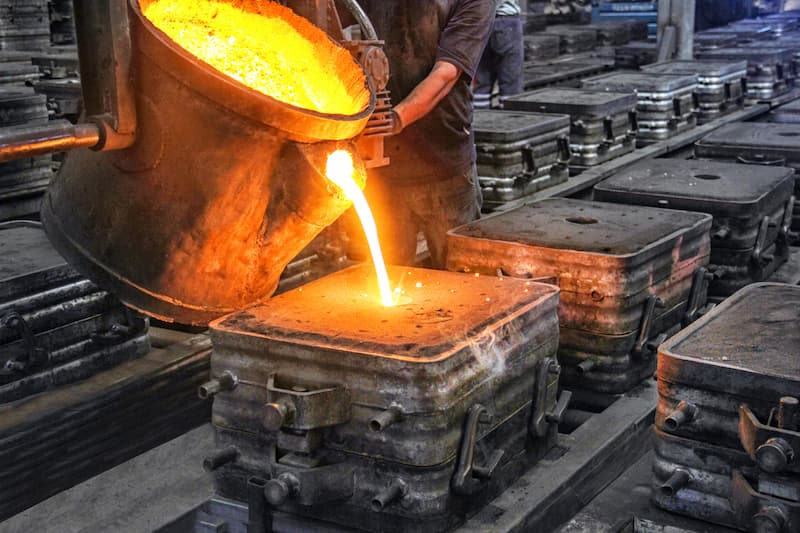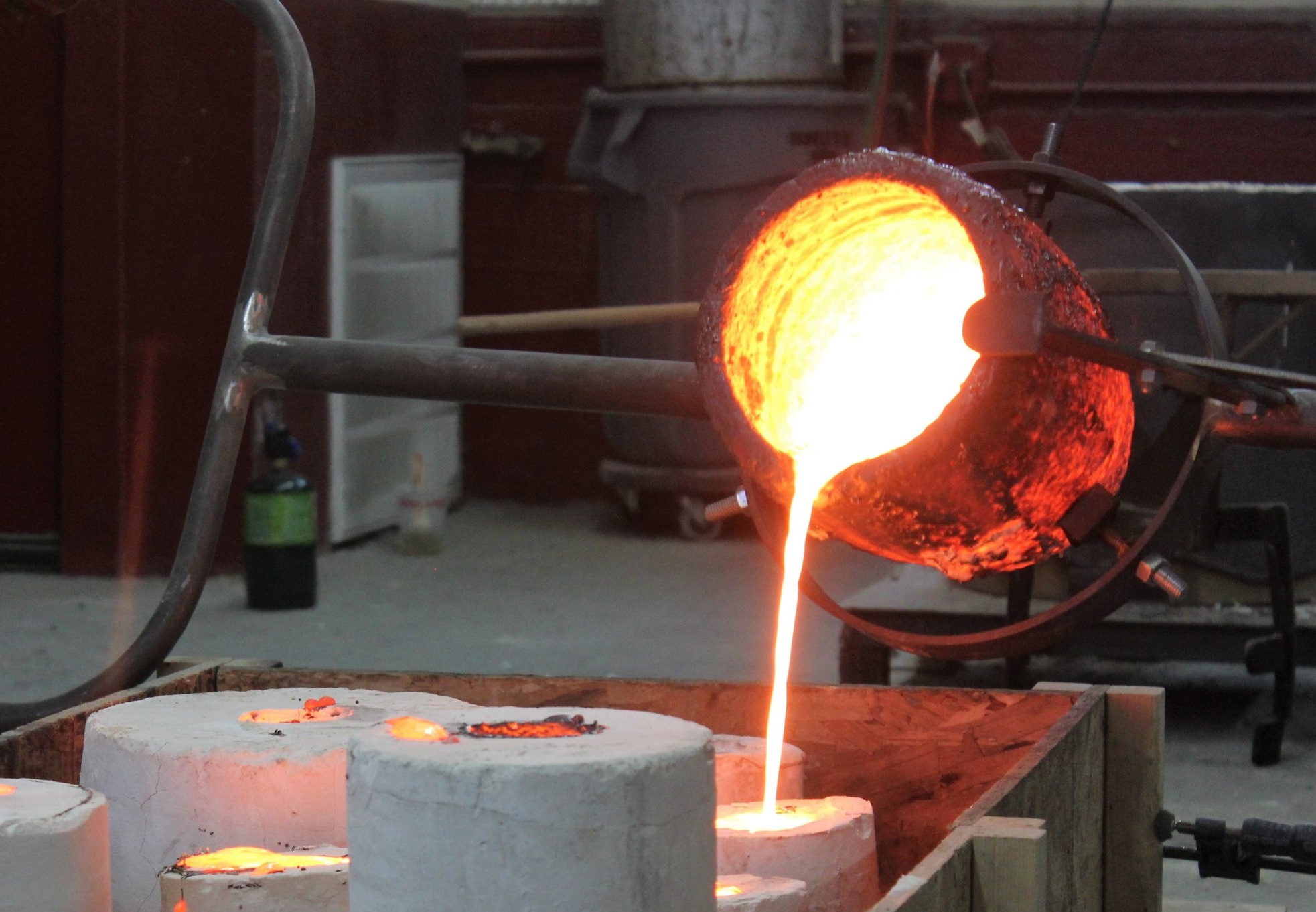Closer Look into How a Metal Foundry Operates
Wiki Article
A Comprehensive Overview to Metal Casting: Benefits and Providers Provided by Foundries
Metal casting is a crucial process in different industries, providing countless benefits via the services of factories. These facilities transform molten metal into specific and resilient parts, catering to particular client requirements. By using advanced modern technologies, foundries ensure top quality and effectiveness in manufacturing. However, the ins and outs of metal casting and the varied techniques included elevate essential concerns concerning its role in contemporary production. What technologies exist ahead in this necessary area?Understanding the Metal Casting Process
The metal casting procedure is an essential strategy made use of in manufacturing to create complex shapes and components. This technique involves pouring molten metal right into a mold and mildew made to create the wanted object. The process begins with pattern production, which functions as a template for the mold. Metal Casting. Numerous products, such as sand, metal, or ceramic, are used for mold-making, relying on the details requirements of the casting
Once the mold and mildew is ready, liquified metal is put right into it and enabled to cool down and solidify. After solidification, the mold is removed, revealing the cast component. Numerous strategies, consisting of sand casting, investment casting, and die casting, are used, each fit to different applications and products. Quality assurance procedures, such as examinations and screening, are necessary to ensure the end product meets specifications. Generally, the metal casting procedure plays a crucial role in producing parts for industries varying from auto to aerospace.
Secret Advantages of Metal Casting
Metal casting provides considerable advantages that make it a preferred production approach in various industries. Its style versatility and precision enable detailed shapes, while cost-efficient mass manufacturing enhances performance. Additionally, the convenience and strength of products made use of in casting add to the durability of the end products.Design Versatility and Accuracy
Launching amazing style versatility and precision, metal casting enables designers and designers to produce detailed forms and features that would be difficult or challenging to achieve with other making methods. This ability makes it possible for the production of complicated geometries, inner frameworks, and fine information that improve item functionality and appearances. Furthermore, numerous casting techniques, such as sand casting, financial investment casting, and pass away casting, offer additional options for modification, accommodating diverse material residential properties and project demands. The versatility of molds permits adjustments throughout the style stage, streamlining the change from principle to end product. Eventually, metal casting sticks out for its capability to deliver high-precision components, making it an indispensable process in industries varying from auto to aerospace and past.Economical Mass Manufacturing
Economical automation stands as one of the primary benefits of metal casting, making it possible for makers to create large amounts of elements at a lower cost per device. This effectiveness occurs from the ability to create intricate molds that can be recycled several times, significantly minimizing arrangement and functional prices. Furthermore, metal casting procedures, such as sand casting and pass away casting, permit high throughput, making it practical to satisfy the demands of large-scale manufacturing runs. The decreased material waste and power usage even more enhance price savings, making metal casting an attractive alternative for markets needing bulk components. On the whole, the economical nature of metal casting positions it as a preferred method for manufacturers going for economic effectiveness in their manufacturing processes.Product Flexibility and Toughness
One of the standout attributes of metal casting is its remarkable material convenience, which allows for using a large range of metals and alloys. This flexibility enables makers to pick materials that finest fit their specific applications, from light weight aluminum and bronze to iron and steel. Each metal offers distinct properties, consisting of differing levels of stamina, deterioration resistance, and thermal conductivity. Metal casting can produce components that meet rigorous efficiency requirements across diverse markets, such as auto, aerospace, and construction. Furthermore, the stamina of actors metals can be improved with numerous treatment processes, making certain longevity and longevity. Aluminum Foundry. Generally, the mix of material convenience and inherent stamina makes metal casting a favored choice for creating high-grade elementsKinds of Metal Casting Strategies
Metal casting encompasses a range of techniques that deal with different manufacturing requirements and product residential properties. Common methods consist of sand casting, which makes use of a sand mold for complicated shapes, and financial investment casting, recognized for its precision and surface area finish. Pass away casting is an additional method that uses high-pressure injection of molten metal right into molds, suitable for mass manufacturing of small parts.Covering molding supplies a quicker alternate, making use of a resin-coated sand to develop thin-walled molds, while lost foam casting enables intricate image source designs without the need for a core.
In addition, continual casting is used for producing long areas of metal, such as bars or sheets, by solidifying molten metal in a continuous process. Each method is and provides special benefits chosen based on elements like the required detail, production volume, and product kind, guaranteeing remarkable end results in metal construction across various industries.
The Function of Foundries in Metal Casting
Foundries play a pivotal function in the metal casting procedure, working as the facilities where molten metal is transformed right into ended up products. These specialized establishments are geared up with the necessary tools and technologies to deal with different steels, guaranteeing high-grade end results. Shops are accountable for a number of vital features, consisting of thawing the metal, putting it into molds, and allowing it to solidify.Furthermore, they maintain rigorous safety and environmental criteria to secure employees and minimize ecological influence. Experienced specialists and engineers collaborate to maximize casting procedures, boosting efficiency and lowering waste. Foundries likewise take part in quality control procedures, ensuring that the end products satisfy details tolerances and specifications. This quality control is crucial for markets that depend on specific elements, such as automotive and aerospace. Therefore, factories add substantially to the total production landscape, enabling advancement and development across various sectors.
Custom Metal Casting Providers
Personalized metal casting solutions supply tailored design solutions that fulfill certain client requirements. These solutions likewise offer material selection experience, ensuring the appropriate metal is picked for the preferred application. Such versatility and understanding enhance the total top quality and efficiency of the final product.
Tailored Style Solutions
Customized style solutions in metal casting give makers with the flexibility to develop components that satisfy certain performance and aesthetic requirements. Factories supply tailored solutions that permit customers to specify measurements, forms, and surface area finishes to achieve desired results. This modification procedure typically includes collaboration in between developers and engineers, making certain that the end products align with operational demands and industry standards. Advanced innovations, such as computer-aided design (CAD) and simulation software, make it possible for accurate modeling and screening of components before manufacturing, lessening errors and enhancing efficiency. By leveraging tailored layout remedies, services can optimize capability while decreasing waste and costs, eventually causing an extra one-upmanship in the market. This versatility is essential for markets requiring special applications and requirements.Material Choice Competence
When picking materials for metal casting, knowledge plays a crucial role in making certain that the ideal selection aligns with both performance needs and cost-effectiveness. Shops use proficient professionals who recognize the residential or commercial properties of different steels and alloys, permitting them to advise ideal materials for specific applications. Factors such as strength, corrosion resistance, and thermal conductivity are carefully considered to fulfill the client's needs. Additionally, industry fads and improvements in product science educate see here these decisions, allowing foundries to stay competitive. By leveraging their proficiency, factories can aid clients in guiding through complicated product options, inevitably leading to enhanced product high quality and reduced manufacturing costs. This customized knowledge is essential for achieving effective outcomes in personalized metal casting services.Quality Assurance in Metal Casting
Quality assurance in metal casting is essential to assure that the end products satisfy the called for specifications and efficiency standards. Factories use a range of strategies and approaches to assure the highest top quality of cast parts. This process starts with stringent product inspections, validating that resources abide by sector standards. Throughout the casting procedure, real-time monitoring and testing are carried out to assess criteria such as temperature level, mold stability, and dimensional accuracy.
Applications of Metal Castings Across Industries
Metal castings play a vital duty in various sectors, acting as the foundation for plenty of applications. In the auto industry, cast components such as engine blocks and transmission real estates are required for vehicle efficiency and integrity. The aerospace market counts on accuracy castings for essential components that assure safety and effectiveness in trip. Additionally, the building industry utilizes metal spreadings for fixtures, installations, and structural aspects, boosting the longevity of buildings and framework.Furthermore, the power field take advantage of castings made use of in wind turbine blades and other devices essential for power generation - Metal Casting. The medical field also utilizes metal spreadings in tools and tools, demonstrating the convenience of this manufacturing process. Generally, metal castings are important to the functionality and innovation of varied sectors, showcasing their relevance in contemporary innovation and infrastructure advancement
Regularly Asked Concerns
What Products Are Commonly Used in Metal Casting?
Common materials utilized in metal casting include aluminum, iron, steel, brass, and bronze. Each material provides unique residential or commercial properties suitable for numerous applications, permitting manufacturers to pick the finest option based upon weight, corrosion, and stamina resistance.How much time Does the Metal Casting Process Generally Take?
The metal casting process commonly takes a number of hours to a couple of days, depending upon factors such as the intricacy of the style, type of metal made use of, and the certain casting method used by the factory.
What Is the Environmental Influence of Metal Casting?
The environmental influence of metal casting consists of energy intake, emissions, and waste generation. Shops usually carry out measures to minimize these impacts, such as recycling products and using cleaner technologies to lower their environmental footprint.Can Metal Casting Be Provided For Small-Scale Projects?
Metal casting can undoubtedly be carried out for small jobs. Various factories accommodate such demands, providing tailored options that accommodate minimal production runs while keeping high quality and precision in the last products.What Are the Precaution in Metal Casting Foundries?
In metal casting shops, precaution consist of personal protective tools, proper air flow, training on tools usage, emergency treatments, routine upkeep checks, and adherence to sector safety criteria to reduce threats related important source to liquified metal and harmful materials.Additionally, metal casting processes, such as sand casting and pass away casting, permit for high throughput, making it feasible to fulfill the demands of large production runs. One of the standout features of metal casting is its impressive product adaptability, which permits for the use of a large array of alloys and metals. Furthermore, continual casting is used for generating long areas of metal, such as bars or sheets, by solidifying liquified metal in a continual procedure. Shops play a critical duty in the metal casting process, offering as the facilities where liquified metal is transformed right into ended up items. Typical products utilized in metal casting consist of aluminum, iron, brass, steel, and bronze.
Report this wiki page